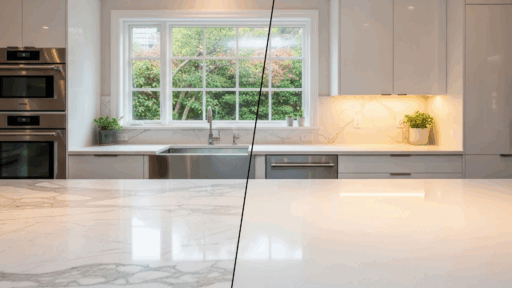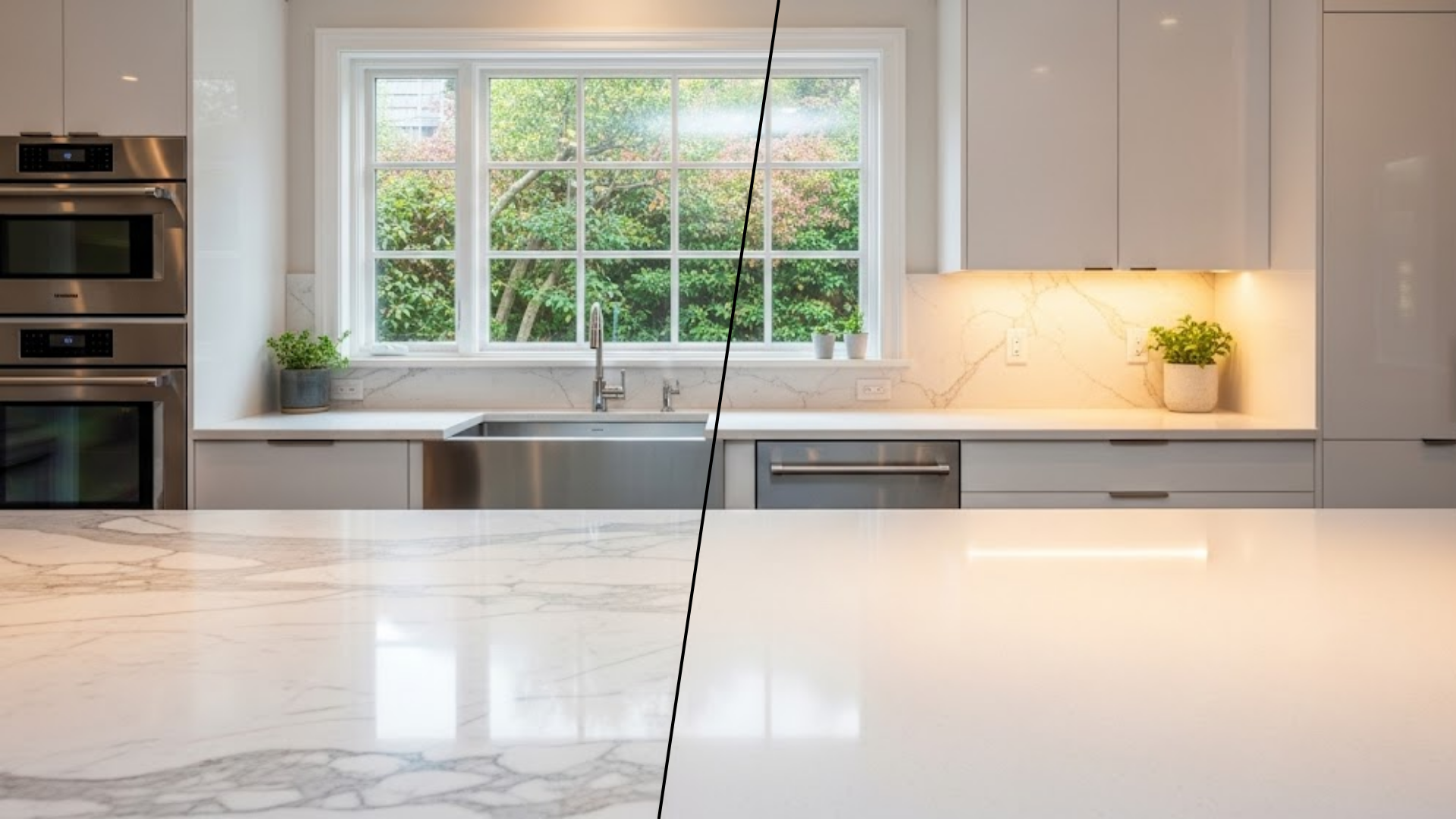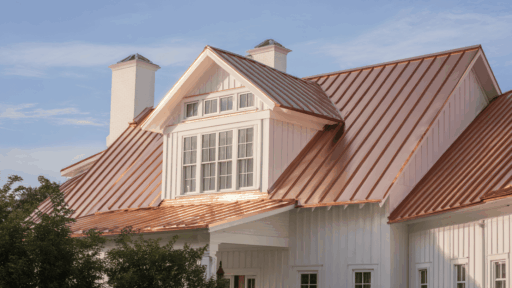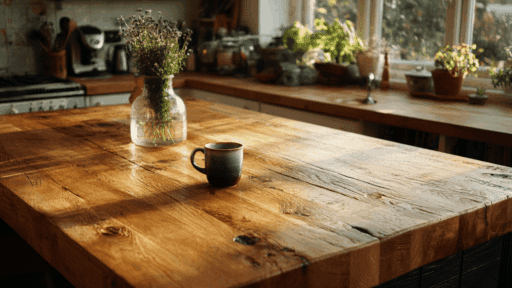You want something that looks great, lasts long, and fits your budget.
But with so many options out there, how do you decide between marble and quartz?
I’m here to help you make this important choice easier. In this guide, I’ll break down everything you need to know about marble vs quartz countertops, from costs and maintenance to durability and style.
You’ll learn about the pros and cons of each material, see how they compare in real-world use, and get practical tips to help you choose what works best for your home and lifestyle.
By the end, you’ll know exactly which countertop material is right for you.
Understanding Marble vs Quartz Countertops
When I considered new countertops, I wanted to understand the differences between marble and quartz truly.
Marble, with its unique veining and beauty, instantly draws my attention and adds unmatched luxury to the kitchen. The natural coolness makes it a great surface for baking, but I’ve learned it’s porous, so stains and scratches require regular sealing and more care than other options.
Quartz, on the other hand, is engineered for durability. It’s non-porous, so I wouldn’t have to worry about staining or frequent maintenance, and it comes in an impressive variety of styles that can even mimic marble. But quartz is less heat-resistant than marble and sometimes lacks the natural character I love.
Is Quartz Porous?
Quartz countertops are non-porous, meaning they do not have tiny pores or voids where liquids can seep in or stain the surface.
This characteristic is due to quartz being an engineered stone, composed of about 90% natural quartz combined with resins and binders that fill the natural pores found in raw quartz stone.
As a result, quartz countertops resist staining and bacterial growth, making them highly durable and hygienic for kitchen and bathroom use.
Unlike natural stones such as marble or granite, quartz does not require sealing or special maintenance to protect against moisture or spills. Its non-porous surface also makes cleaning easy and effective, requiring only mild soap and water for regular upkeep
Marble vs Quartz: Key Comparison Factors
When choosing between marble and quartz countertops, I quickly realized several key comparison factors set them apart. Deciding what matters most for my lifestyle and style goals makes one option stand out over the other.
The following is how I view marble vs quartz material on these crucial points:
1. Aesthetic Appeal and Design Options
From a design perspective, marble draws me in with its completely natural veining; no two marble slabs are ever the same, making each piece feel truly unique and luxurious. The gentle color variations and organic flow of patterns add a timeless classic beauty, which instantly elevates any kitchen or bathroom.
On the other hand, quartz wins for sheer variety; because it’s engineered, I can choose from a vast array of colors and patterns, including styles crafted to mimic marble or offer ultra-modern, uniform looks.
If I want absolute consistency or a bold color, quartz gives that control; if my heart craves one-of-a-kind, organic beauty, marble is still unmatched.
2. Durability and Performance
When it comes to day-to-day use, I’ve found quartz much more resilient to the realities of busy kitchens. It’s non-porous, scratch-resistant surface resists staining, chipping, and scratches from daily prep or spills, plus, it won’t harbor bacteria, making it ideal for hygiene.
Marble is softer and more porous, so I have to accept that it will develop marks, scratches, and the occasional stain over time, especially from acidic foods. While marble is more resistant to heat, sudden temperature shifts can still cause damage.
Quartz, though generally heat-resistant, can warp or discolor under very hot pans. Overall, if I want fuss-free durability, quartz stands up better to hard use.
3. Maintenance Requirements
I appreciate how low-maintenance quartz is in my daily routine; it only needs a wipe with mild soap and water, and never requires sealing. It shrugs off most stains or spills, so I spend less time worrying about accidents.
In contrast, marble demands commitment; I’d need to seal it every 6–12 months and avoid harsh or acidic cleaners to prevent etching.
Spills need immediate attention, especially from wine, citrus, or oils. While the practice of caring for marble can be rewarding if I love the material, realistically, quartz is significantly easier and more convenient if my schedule is demanding.
4. Cost Comparison
Budget considerations make a big difference for me. Quartz typically comes at a lower price per square foot and is cheaper to install, while marble can get very expensive, especially for rare or highly sought-after types.
Beyond that, marble’s ongoing maintenance, like sealing and potential repairs for etches or stains, adds to its lifetime cost.
Quartz, with its minimal upkeep and long-lasting finish, proves to be more cost-effective in the long run. If I’m leaning toward affordable beauty that doesn’t require frequent upkeep outlay, quartz makes the most sense, while marble is reserved for a luxury splurge.
5. Environmental and Practical Considerations
From an environmental lens, I see quartz as having a slight edge due to its manufacturing process, which can include recycled materials and generate less quarrying waste. Its durability also means less frequent replacement and waste over time.
Marble, though a natural and long-lasting resource, has a higher environmental impact due to quarrying and shipping. If minimizing my environmental footprint is a priority, quartz appeals to my eco-conscious side. Both are strong choices for practical longevity, but quartz edges ahead for sustainability and ease of daily use
Pros and Cons of Marble and Quartz Countertops
Marble and quartz countertops are both popular choices in kitchens and bathrooms, each offering distinct advantages and drawbacks.
Marble is prized for its unique natural beauty and luxurious appearance, while quartz is favored for its durability and low maintenance.
| Aspect | Marble Countertops | Quartz Countertops |
| Pros |
|
|
| Cons |
|
|
Marble vs Quartz Inspirations
Choosing between marble and quartz countertops opens up a world of design possibilities for your kitchen or bathroom.
Both materials offer distinct looks and unique advantages: marble delivers natural beauty and classic veining, while quartz boasts durability and a wide spectrum of customizable styles.
1. Luxe Vein Drama
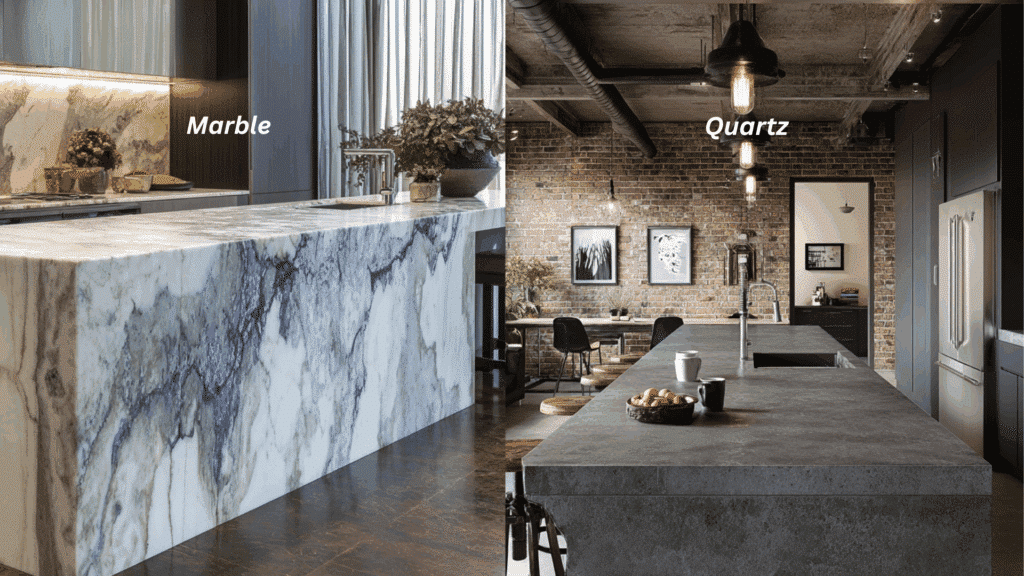
The marble countertop radiates a luxurious, artistic vibe with its bold, unpredictable veining. I feel it adds drama and class, becoming the kitchen’s focal point.
Quartz, on the other hand, feels more industrial and understated with its matte finish and uniform texture.
It offers a modern, minimalist aesthetic, perfect for loft-style or urban spaces without the unpredictability of natural stone.
2. Midnight Beauty
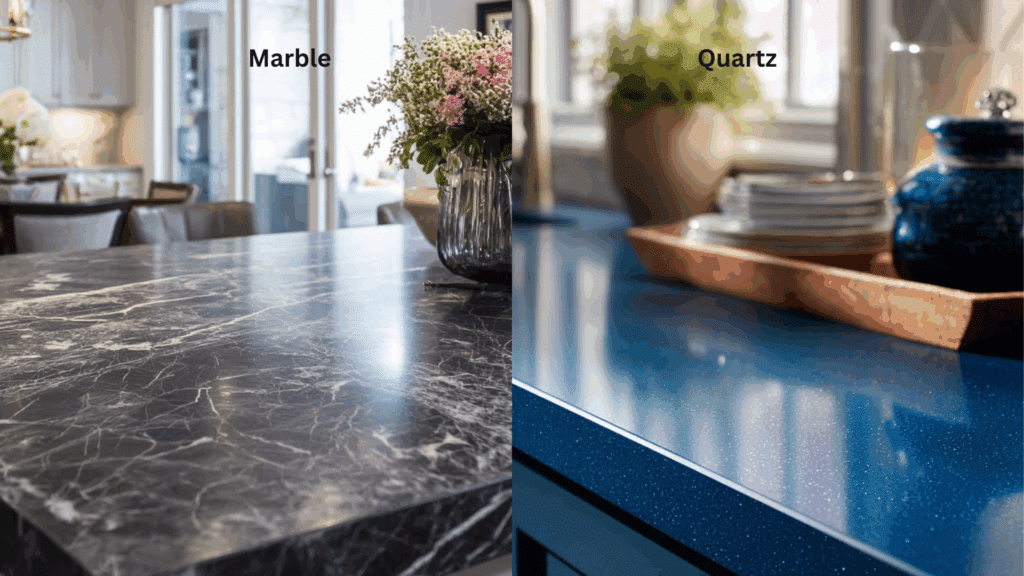
The marble here gives a timeless and moody feel with its deep color and beautiful white veining. I love how it makes the space look classic and high-end.
Quartz brings a playful, contemporary energy with its blue hue and subtle sparkle. It feels fun and experimental, making the kitchen pop with a bold personality.
3. Subtle Serenity
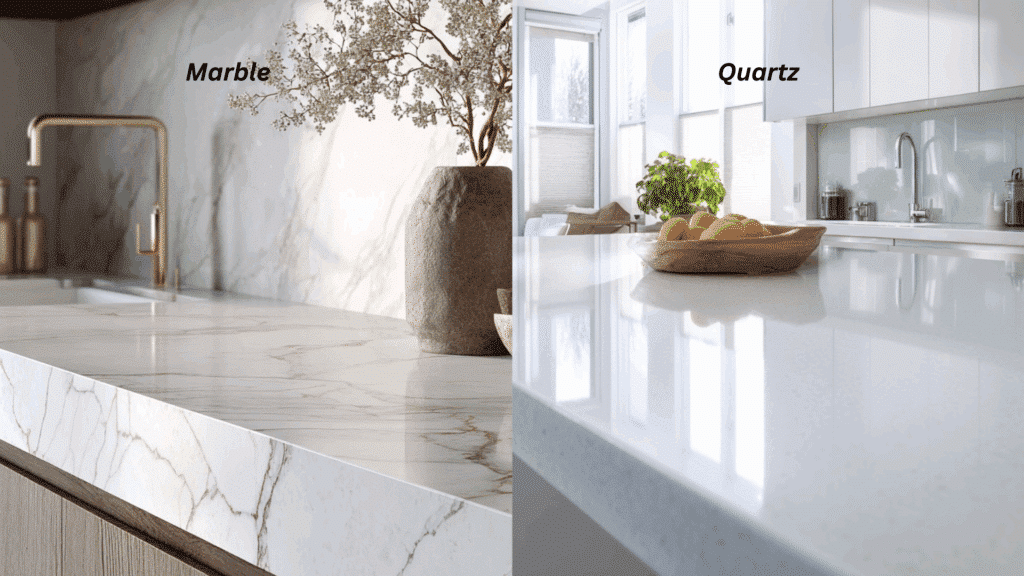
The marble countertop exudes organic beauty with its soft, creamy tones and delicate veining. I think it creates a soothing, calming environment, especially paired with warm metals.
The quartz option, however, is sleek and highly polished, giving a clean, almost clinical vibe. It’s modern and bright, perfect for achieving a light, airy, and ultra-tidy kitchen design.
4. Classic Romance
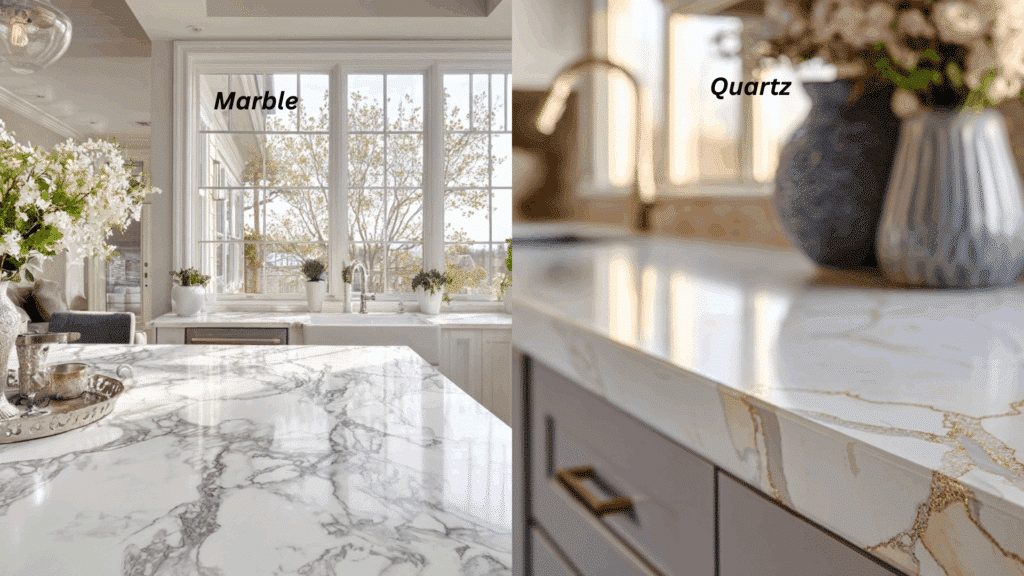
The marble surface here feels effortlessly romantic with its soft gray veining and luminous polish. I feel like it makes the kitchen warm and inviting.
Quartz, with its precise veining and slightly sharper finish, comes across as more contemporary and chic. It has a slightly dressier feel, ideal for those who prefer an upscale, curated look.
5. Crystal Beauty
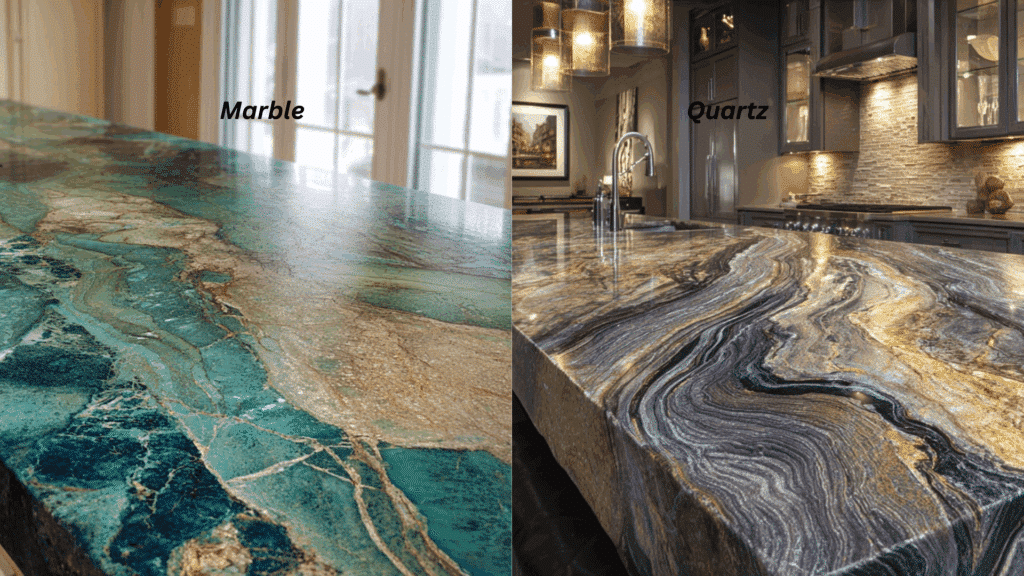
The marble instantly commands attention with its striking green and earthy tones. I find it gives off an exotic aura, perfect for eclectic spaces.
Quartz, on the other hand, leans into drama with its deep metallic veining and rich contrast. It feels luxurious and bold, making a confident statement in a modern or glam kitchen
The Bottom Line
Both marble vs quartz have their place in modern homes.
If you love natural beauty and are willing to accept regular maintenance, marble could be the perfect match for you. However, if you’re looking for something that’s practically bulletproof and suits a busy lifestyle, quartz might be the way to go.
The right countertop is the one that fits your cooking habits, maintenance preferences, and budget.
Your countertops will be with you for years to come, so make sure you choose something you’ll truly love living with.
Ready to start your countertop search?

